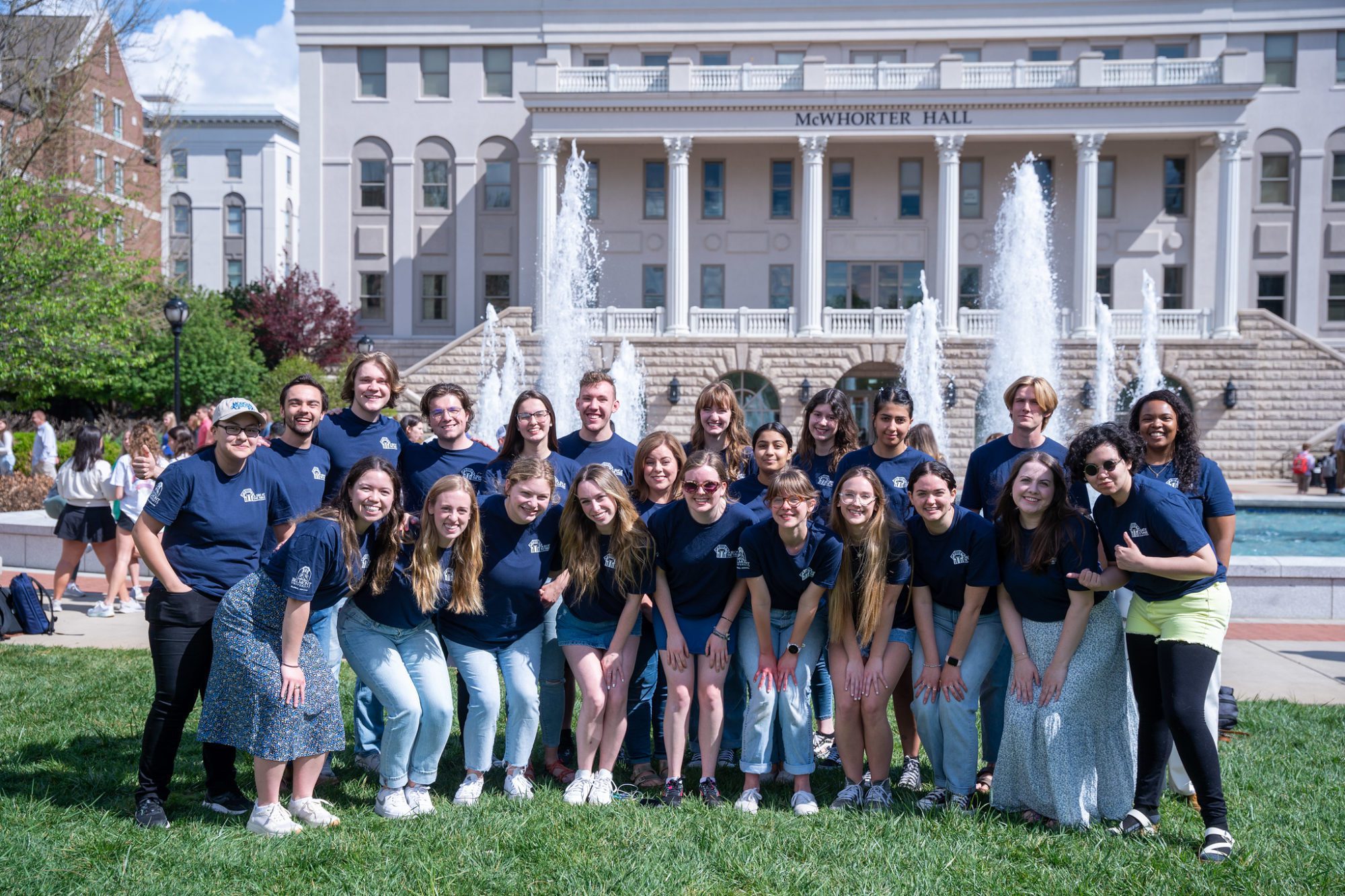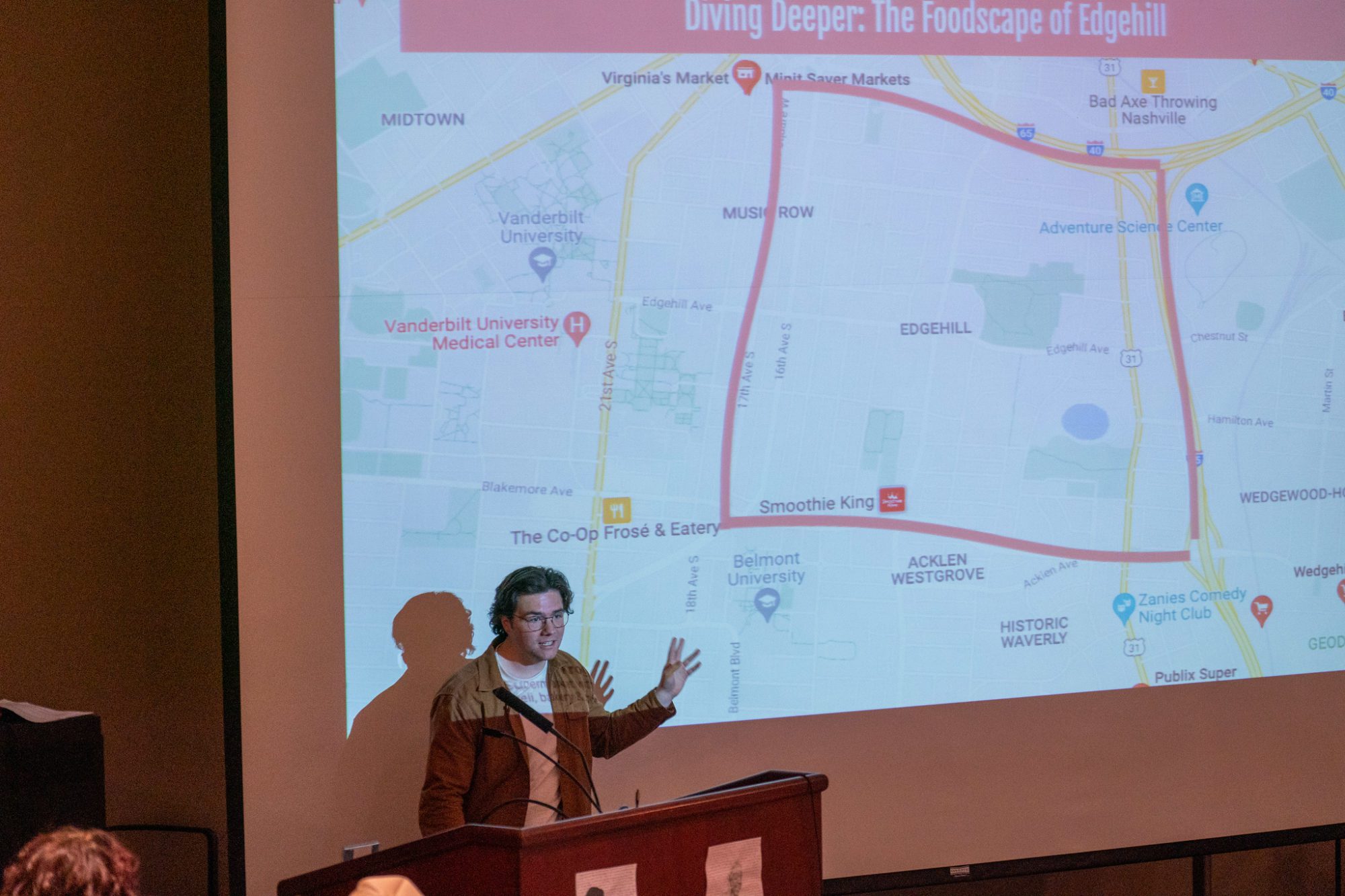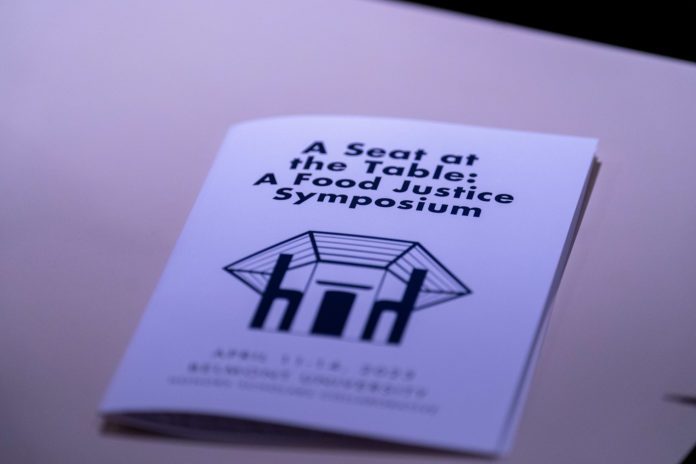Belmont Global Honors broke new ground with its junior-year Honors Scholars’ Collaborative program, which focuses on issues identified within the UN’s Sustainable Development Goals. Two sections of this year’s collaborative took on a pressing challenge together: food justice.
Dr. Sarah Blomeley and Dr. Heather Finch paired their junior-level honors classes, and as a result of their two semesters of work, presented a series of events called A Seat at the Table: A Food Justice Symposium, which was held April 11-14.

Events included:
VOICES OF EDGEHILL: AN ORAL HISTORY OF OUR FOODSCAPE
Junior Honors students presented a collaborative oral history project — a culmination of interviews and research on the topic of food apartheid in the 12 South/Edgehill neighborhood.
HUNGRY TO LEARN SHOWING
A documentary introduced the faces behind a hunger crisis unfolding on American campuses, and what can — and should — be done about it.
CONFRONTING OUR FOODSCAPE: THE REALITY OF FOOD APARTHEID IN BELMONT’S NEIGHBORHOOD
Students presented their documented experience feeding themselves “on foot” in Edgehill and 12 South after an academic year studying food insecurity, food apartheid and food justice.
BELMONT FOOD CRITICS LIVE!
The Belmont Food Critics moderated a discussion on our food landscape.
PANCAKES AND PALS PICNIC
A community picnic and pancake bar catered by Sodexo took place on the main lawn with the goal of strengthening the connection between students and Sodexo staff.
FOOD JUSTICE IN NASHVILLE: A CONVERSATION WITH STATE SENATOR JEFF YARBRO
This end cap to the week’s events predominantly centered on Senate Bill 1049, which would create a farmer’s market food permit for food service establishments to operate throughout a permit year at farmer’s markets. Passing this bill would increase the availability of fresh, prepared foods for our community members.

By bringing together students and faculty from various disciplines and encouraging them to delve into issues surrounding access to nutritious food and the ethics of the food industry, this symposium aimed to spark thought, discussion and participation.
Over the course of the year in preparation for these events, Dr. Blomeley’s class dove specifically into the issues of food deserts and injustice in the Edgehill community. With a focus on collecting oral histories from residents, working with local non-profits and connecting with Senator Yarbro, the class sought to better understand issues that contribute to the challenges of the neighborhood, how Edgehill’s history led to the current state of food insecurity faced by numerous residents and to consider Belmont’s role in our neighborhood.
“I’d argue that food apartheid is a more accurate reference to what’s happening to the foodscape in neighborhoods like Edgehill,” said Lynn Flaugh-Reynolds, junior. “Like many of my peers have expanded upon, food apartheid emphasizes that the lack of available nutritious food within a reasonable distance is a form of prejudice, of discrimination. It’s a choice, not coincidence.”
Flaugh-Reynolds said she’s most proud of their “collaboration and cohesion as a class.” She said, “It was really touching to see how we all worked together as a class to bring our project to life. We all really cared about the topic and educating people about food apartheid.”
Dr. Finch’s class focused on campus food resources. Through their partnership with Sodexo, they delved into the food opportunities available while also examining the gaps in resources for students, staff and faculty. With a vision to one day establish an on-campus grocery store, their work aims to ensure those within our community have access to healthy food. The goal of the work also aims to bridge the gap between students and Sodexo, ensuring that everyone’s voice is represented.
Dr. Bonnie Smith Whitehouse, the director of the program, believes that the distinctive nature of this program lies within its immersive approach to learning. “Honors Scholars’ Collaborative is a distinctive feature of Belmont Global Honors,” she said. “It is a unique opportunity for undergraduates to have three classes in the Honors Core in which they dream up, propose, execute and share a big project. Most students don’t get this opportunity in their undergraduate years. It is a real testament to the opportunities we offer our Honors students here at Belmont.”
Whitehouse says students use the UN Sustainable Development Goals as an aspirational framework to think about what problems they want to solve with their big project. UN Sustainable Development Goals are 17 interconnected goals that provide a vision for how the world can be more equitable, fair and just for all – with an impetus on reaching them by 2030.
All students in Belmont Global Honors take a set of three classes as part of the Honors Scholars’ Collaborative. Students work in small interdisciplinary teams within the first class in the sequence in the fall of their junior year. At the end of the fall semester, they come together with the larger Belmont Global Honors community to present their ideas for their research. Students then return in the spring for the second course in the series with the same students and faculty they were with in the fall and work as a team. They come together from different disciplines and backgrounds to ask their research question and execute it. The Food Justice Symposium is an example of the culmination of this work.
In the fall, students from all sections return for the third class in the sequence and process the results of their work and how it can continue.
Click here for more information about Belmont Global Honors.



